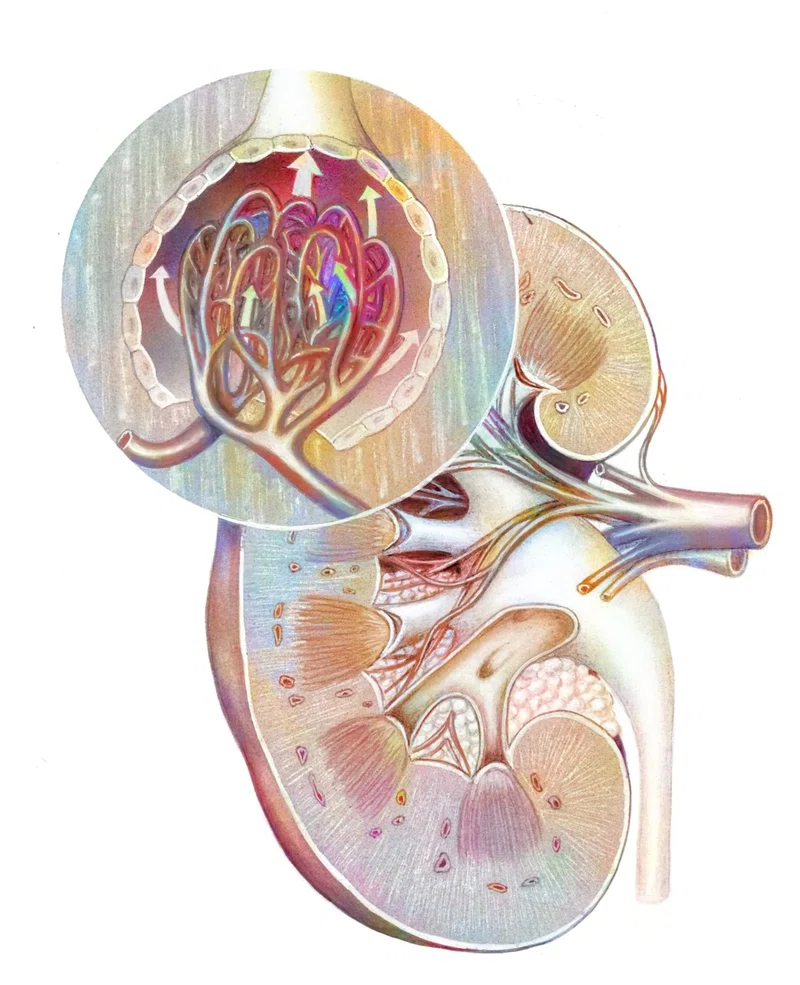


clinical research
Novel Findings May Improve Kidney Injury Outcomes
Novel Findings May Improve Kidney Injury Outcomes

The global burden of chronic kidney disease is rising.
Chronic kidney disease (CKD), or chronic kidney failure, is a long-term condition in which the kidneys gradually lose their function and it progressively worsens. According to the National Kidney Foundation, 37 million adults are currently living with CKD, and nearly 90 % are unaware they have it. CKD is often described as a silent epidemic.
Luan D. Truong, MD, Medical Director, Renal Pathology, and Professor of Pathology and Genomic Medicine, in collaboration with researchers at the University of Colorado, demonstrated that acetylcholine synthesis in podocytes in the kidney protected against inflammation and glomerular endothelium damage in anti-glomerular basement membrane (anti-GBM) glomerulonephritis. This study is published in the Journal of the American Society of Nephrology.
CKD includes several types: glomerulonephritis (GN), polycystic kidney disease, diabetic kidney disease, nephrotic syndrome, interstitial nephritis, and kidney infections. GN is characterized by inflammation of tiny filtering units in the kidney known as glomeruli. Causes of GN include autoimmune diseases, infection and genetic conditions.
Luan D. Truong, MD
In most cases, CKD development is characterized by inflammation—a complex process regulated by diverse endogenous mechanisms that include the activation of innate immune cells, increased production of inflammatory cytokines and the dysregulation of anti-inflammatory pathways.
Acetylcholine, a neurotransmitter, is crucial for several key functions, including muscle movement, memory, learning and the autonomous nervous system. It also plays a key role in the endogenous mechanisms of the kidney and helps regulate inflammation. Specifically, it ameliorates inflammation-mediated kidney injury, a condition in which the kidneys stop functioning effectively.
Interestingly, acetylcholine is also expressed in non-neuronal cells. However, its expression in the kidney was not known until this study. Additional key findings from this study include:
- The podocyte—a specialized epithelial cell playing a major role in the glomerular filtration barrier—is one of the sources of acetylcholine production.
- In glomerular disease there is an increase in acetylcholine and upregulation of choline acetyltransferase (ChAT)—the enzyme that catalyzes the biosynthesis of acetylcholine from acetyl CoA and choline.
- Acetylcholine/ChAT production can be induced in podocytes.
Our study suggests that, besides controlling the filtration barrier, podocytes also orchestrate the local intraglomerular anti-inflammatory response and protection of the endothelium by releasing acetylcholine, which inhibits cytokine/chemokine production and maintains endothelial integrity. We also identified a novel role for podocyte acetylcholine as a protectant in GN, which may lead to innovative, non-immunosuppressive approaches for treating glomerular diseases.
Luan D. Truong, MD
Medical Director, Renal Pathology
Professor, Pathology and Genomic Medicine
“Our studies support a role of podocyte-acetylcholine as an important endogenous anti-inflammatory and endothelial defensive factor that can be regulated and provides protection in GN,” said Truong.
The anti-GBM GN is a severe kidney inflammation model in which the glomerular microvascular network is disrupted. Using this model, Truong and his team demonstrated that acetylcholine protects against kidney injury by reducing the expression of cytokines and chemokines.
According to Truong, “In addition to controlling the filtration barrier, podocytes also orchestrate the local intraglomerular anti-inflammatory response and protection of the endothelium by releasing acetylcholine, which inhibits cytokine/chemokine production and maintains endothelial integrity. We also identified a novel role for podocyte acetylcholine as a protectant in GN, which may lead to innovative, non-immunosuppressive approaches for treating glomerular diseases.”
Furthermore, Truong’s study suggests a protective effect of acetylcholine in human diseases, based on the following:
- the microarray of human kidney samples showed higher ChAT expression in CKD patients as compared to normal subjects.
- Alzheimer’s disease patients receiving cholinesterase inhibitors have lesser chances of CKD progression, myocardial infarction, and cardiovascular death
Luan D Truong, Jessica Trostel, Carlos Roncal, Gabriel Cara-Fuentes, Makoto Miyazaki, Shinobu Miyazaki-Anzai, Ana Andres-Hernando, Fumihiko Sasai, Miguel Lanaspa, Richard J Johnson, Gabriela E Garcia. Production of Acetylcholine by Podocytes and its Protection from Kidney Injury in GN. J Am Soc Nephrol. 2025 Feb 1;36(2):205-218. doi: 10.1681/ASN.0000000000000492.
Funding was provided to G.E. Garcia: National Institute of Diabetes and Digestive and Kidney Diseases (DK082509).
Share this story
Abanti Chattopadhyay, PhD
August 2025
Related Articles




